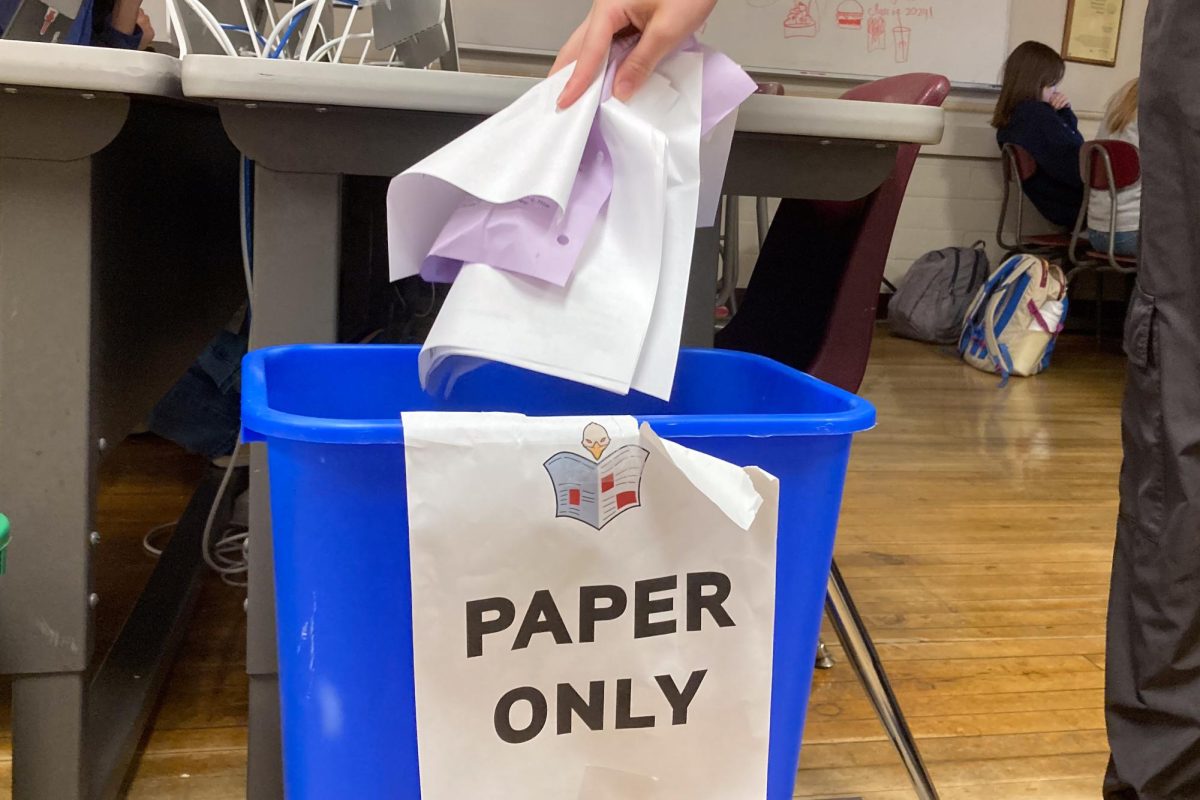The Cheating Phenomenon
December 19, 2015
As a teenager, I’ve learned a few tips and tricks on how to survive the harder parts of high school, especially cheating. Whether it be writing notes on my arm or looking at a paper in my lap, my cheating habits have bumped up my test scores…more than once. The idea that cheating is bad has been drilled into my mind since I was old enough to read and recite the alphabet. Copying someone’s work onto your own test or homework is what is most commonly defined as cheating, but the possible consequences are much more serious than the act itself.
It seems the motto nowadays “if you’re not cheating, you’re not trying” is becoming much more relevant in my life and the lives of my peers. I’ll admit it, I’ve been there…a few times. Being a teenager, taking the easy way out is just part of my nature. But in reality, stealing an answer or two for a better grade isn’t worth the F I’d receive and the permanent notation on my educational record that could ruin my far fetched dreams of Ivy League acceptance.
Cheating consequences should be lessened, teachers should spend more time stressing the importance of learning instead of grades, and assignments should be shortened in order to maximize the time students have to engage in activities, clubs, family time, or work.
Students should never feel the urge to cheat to receive a better grade than they would if they took the time to do the assignment themselves. Learning should be beneficial to the students and enrich their lives rather than being an obstacle holding them back from participating in other activities.
Students understand there are consequences, often major ones, if they do happen to cheat, but they wouldn’t feel the need to cheat if they properly understood all the content.
As a sophomore, I’m expected to do a lot in regards to school. I must complete at least one assignment every night for every class, sometimes more, and am expected to be well rested, alert, and participating during class. I’m also always expected to go above and beyond for the A, but it’s hard when I’ve stayed up all night working on all my homework from the day before.
I mostly feel the urge to cheat when I don’t understand, forget, or run out of time to complete an assignment or test. Teachers need to take the time to teach lessons more thoroughly for the comprehension of their students. The copious amounts of homework teachers give causes students to sacrifice most of their time for a good grade.
Cheating is a habit I’ve given into a few times during my educational career. I personally know that if the risk of cheating pays off, I could potentially receive a higher grade than I would putting an answer I’m not sure of on the paper.
Teachers have done everything they can to prevent students from using information from another person on a test. Whether it be changing the order of the answers, folders around your head, or a notecard to cover your answers, teachers are cautious about how their students take exams.
If I were caught cheating, my parents would be called and I’d fail the test or assignment. The consequence is too extreme for just one run-in with the rules. In high school, students should receive a warning and a solo retake if they’re caught once. If they cheat again, the punishment should be more harsh.
Approximately 20 percent of City High’s population has a full schedule of seven classes. I happen to be a part of that 20%, and trying to finish my homework in all my classes and still getting a full eight hours of rest is next to impossible for me. Cheating could save hours and open up space for more leisure time.
If teachers gave shorter assignments, my work could be much more quality and I would have more free time for reviewing for tests. I may also feel less of an urge to cheat when I’m only assigned two or three hours of accumulative homework every night. Taking the time to look up an assignment online or asking a friend for answers would take more time than the assignment itself. Shortened assignments would also give teachers time to go over the assignments in class.
According to a survey given to approximately 5% of City High’s student population, 76% of students reported previous cheating on homework and/or tests. The survey was given to freshmen, sophomores, juniors, and seniors who anonymously answered a series of questions regarding their cheating habits, if any. Of the 104 students recorded cheating, approximately 85% of the students said they cheat occasionally, while others cheat daily or frequently. The majority of students at City cheat, some more than others, which shows their inclination to complete their homework and tests even if unsure of their answers. Only 6% of those students have been caught cheating.
Slight improvements in the educational strategies could potentially lead to more participation from students and higher test scores. When students don’t feel the need to cheat, they actually learn the content and therefore receive higher test scores. Better test scores could also mean a bump in school funding due to the No Child Left Behind Act’s policy.
The urge I feel to cheat comes from stress induced from too much homework. Once the clock reaches 12:30 AM, I have a hard time focusing on the work in front of me. Tired and unmotivated, I search the answers online or ask for a friend’s. I agree cheating isn’t the best strategy, but I’m not left with many other choices. Less homework would mean more sleep, more time participating in things I enjoy or spending time with friends and family, and more quality work.
I strongly believe that cheating could be eliminated or lessened with compromise between teachers and students.



















































